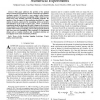Free Online Productivity Tools
i2Speak
i2Symbol
i2OCR
iTex2Img
iWeb2Print
iWeb2Shot
i2Type
iPdf2Split
iPdf2Merge
i2Bopomofo
i2Arabic
i2Style
i2Image
i2PDF
iLatex2Rtf
Sci2ools
125
click to vote
TNN
2008
2008
Towards the Optimal Design of Numerical Experiments
This paper addresses the problem of the optimal design of numerical experiments for the construction of nonlinear surrogate models. We describe a new method, called learner disagreement from experiment resampling (LDR), which borrows ideas from active learning and from resampling methods: the analysis of the divergence of the predictions provided by a population of models, constructed by resampling, allows an iterative determination of the point of input space, where a numerical experiment should be performed in order to improve the accuracy of the predictor. The LDR method is illustrated on neural network models with bootstrap resampling, and on orthogonal polynomials with leave-one-out resampling. Other methods of experimental design such as random selection and -optimal selection are investigated on the same benchmark problems.
Related Content
| Added | 15 Dec 2010 |
| Updated | 15 Dec 2010 |
| Type | Journal |
| Year | 2008 |
| Where | TNN |
| Authors | S. Gazut, J.-M. Martinez, Gérard Dreyfus, Yacine Oussar |
Comments (0)

